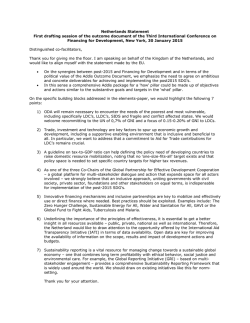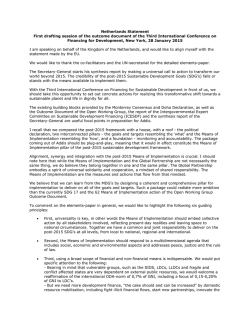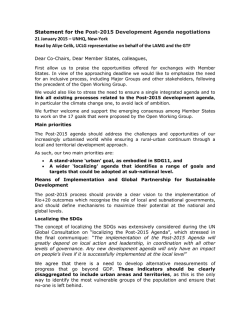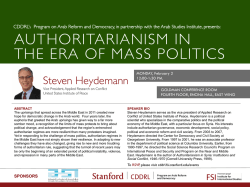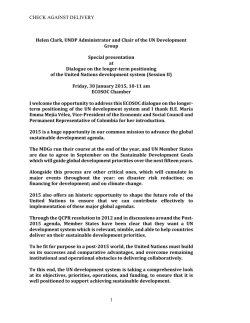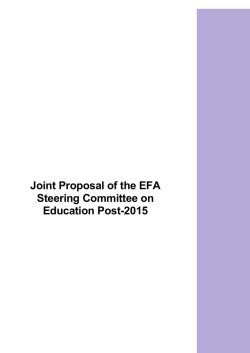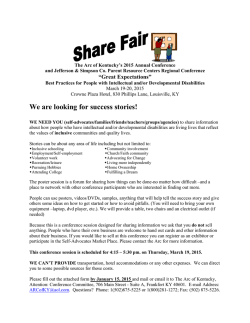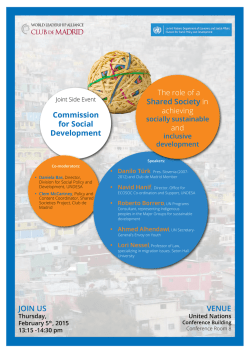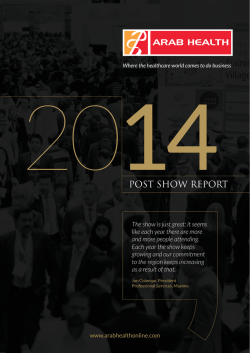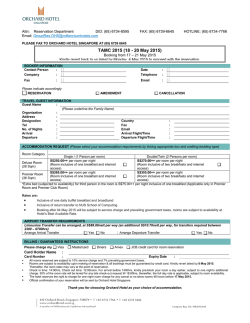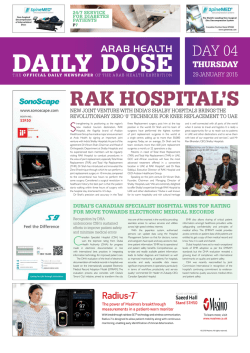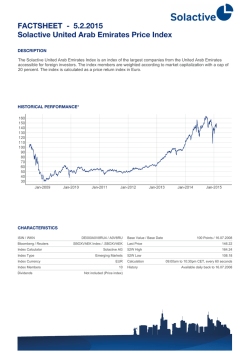
Sharm El Sheikh Statement
Arab States Regional Conference on Education Post-2015 27-29 January 2015, Sharm El Sheikh, Egypt Sharm El Sheikh Statement Preamble 1. We, the Ministers of Education of Arab States, high-level government officials, representatives of the United Nations and intergovernmental agencies, civil society organizations, professional unions as well as technical and development partners, gathered at the Arab States Regional Conference on Education Post-2015 from 27-29 January 2015 in Sharm El Sheikh, Egypt, at the invitation of UNESCO and its partners. 2. We thank the Ministry of Education of Egypt for facilitating and hosting this important event for the region. 3. Having reviewed the progress made and remaining challenges towards reaching the goals of Education for All in the Arab States, and taking into account the Muscat Agreement adopted at the Global EFA Meeting (GEM) in Muscat, Oman, 12-14 May 2014, we endorse the principles and targets set forth in the Muscat Agreement, as well as the Report of the United Nations General Assembly Open Working Group (OWG) for Sustainable Development Goals and the Report of the United Nations Secretary-General on the post-2015 agenda ‘The Road to Dignity by 2030: Ending Poverty, Transforming All Lives and Protecting the Planet.’ We particularly note the primary goal: “Ensure equitable and inclusive quality education and lifelong learning for all by 2030.” 4. Being aware of the exceptional circumstances that some Arab states are going through and their negative impact on what has been achieved in the framework of Education for All, we adopt this statement that reflects our regional concerns and priorities for the Post-2015 Education agenda. Perspectives of the Arab States 5. Education is a fundamental human right. We reaffirm that it is a basis for the realization of other rights and essential for inclusive, equitable and sustainable development, as well as prosperity in the Arab States. We, therefore, commit to work together in our region with its shared unique language and rich cultural traditions and history in order to ensure the fulfilment of everyone’s right to education. We notably commit to the principle of education as a public good and a building block for democracy, social cohesion and sustainable development. 6. We acknowledge that our countries have made considerable progress since 2000 in achieving the Education for All goals. However, we must exert further efforts to meet the new challenges and demands. We maintain that the EFA framework is still valid, but the current EFA goals need to go further in the Post2015 agenda to address all levels of education by giving focus to learning and taking into consideration the transformative, inclusive, lifelong learning approaches. 7. The most significant challenge to progress in the region is conflict which exacerbates inequality, poverty, exclusion and marginalization. The provision of education is strongly impacted by the violation of rights in countries living in conflict and instability and those hosting refugees. Ensuring access to quality education to internally displaced persons and refugee communities exerts enormous pressure on host countries. Evidence clearly demonstrates the long term negative impact of the absence of provision of education on refugees and internally displaced persons of learning age. We must acknowledge that these issues cross national borders and thus regionally supportive strategies and partnerships are required to address them. 8. The promotion of peace and sustainable development must be founded on the provision of equitable and inclusive quality education for all, enabling them to realize their rights and untapped potential in society. Therefore, our education systems need to be resilient to prevent conflict and mitigate its impact, and enhance social cohesion, tolerance and peace. We call upon all parties to observe education as a human right. We therefore commit to developing policies that support the provision of sustainable quality education for all children and others afflicted by emergency and crisis situations and to ensure that refugee children of school-going age have access to educational systems through special educational programmes and policies. Priority areas for the Arab States Equitable and inclusive access for all 9. We will reinforce our efforts to provide at least 9 years of free, compulsory quality basic education for all by 2030, with special attention to early childhood education. We recognize that the foundations of human development are laid during a child's early years and thus early childhood requires an integrated approach to care, development and learning. Therefore, every effort will be made to ensure quality ECCE and increase learning opportunities through community participation, family awareness, and qualified teachers. Equity and inclusion 10. We commit to addressing all forms of exclusion, marginalization, discrimination, disparities and inequalities in access to and completion of education at all levels. We must take serious steps in eliminating the barriers that people with disabilities face to attain their right to education. Despite the fact that Arab states have achieved gender parity in primary education, significant disparities still exist within countries. We will work with our partners to develop effective strategies to overcome all obstacles to enable girls and women to continue their education. We recognize the value of women’s education for our societies to be productive. We will therefore strive to make equity a priority for our education policies, planning and management. 11. We will reinforce the provision of youth and adult education and learning, including literacy, through formal and non-formal pathways, in collaboration with all governmental and non-governmental actors. Quality and relevance of education, and teachers 12. We recognize that education quality is the priority in our region. We must therefore improve and develop all aspects of education quality and invest in policies, programmes and systems of measuring and monitoring learning outcomes. 13. Since the quality of our education hinges on the quality of teachers, we acknowledge that, while the number of qualified teachers continues to rise, we must ensure the provision of sustained professional development for teachers, educators, school management and members of supporting institutions, taking into consideration the best practices in the region and sharing information on these. Citizenship and Education for Sustainable Development 14. We commit to integrating values of citizenship, patriotism and 21st century skills into our education systems by emphasizing the knowledge, skills, values and practices conducive to sustainable development. 15. We reaffirm our commitment to improve TVET and higher education, linking youth training to the requirements of the labor market and providing them with guidance and opportunity to become productive citizens, which in turn contributes to inclusive development in their respective societies. Enabling policies and mechanisms for the future education agenda 16. Considering the impact of experimental and applied educational research on the educational and developmental policies for the post-2015 agenda and to tackle the equity and quality imperatives, we must support it and make better use of best practices and experiences within the Arab region and from other regions. We resolve to develop comprehensive national monitoring and evaluation systems to generate sound evidence which we will use for policy formulation and management of education systems. 17. Other areas for improvement in the Post- 2015 agenda are related to the governance and management of our education systems. We will work together to enhance accountability measures and community involvement to rationalize education decisions. 18. We shall seek to allocate sufficient financial resources in an equitable manner and according to the set internationally recognized benchmarks for public expenditure on education reaching 6% of Gross Domestic Product (GDP) and/or 20% of the total public expenditure at least. We will cooperate with our international partners to develop mechanisms enabling long term planning for providing educational services in emergency situations. 19. We must ensure and invigorate community involvement in articulating educational needs of the most marginalized populations and developing innovative approaches to ensure access, equity and quality of education. 20. We call upon UNESCO, in collaboration with the EFA co-convening agencies and other partners, to continue leading the coordination of the development of the post-2015 education agenda and the corresponding Framework for Action. We further recommend that UNESCO continue to provide technical support for the implementation, monitoring and enhancing accountability of the future post-2015 education agenda, including reinforcing innovative tools like the flagship EFA Global Monitoring Report and working to mobilize the adequate financial resources to support educational systems afflicted by crises and conflicts in the region and advocating to support education for all. 21. We stress the importance of coordination and cooperation with all organizations working on education, in particular ALECSO, ABEGS, LAS and ISESCO in all matters relating to the implementation of the Post-2015 agenda Towards World Education Forum ad Beyond 2015 22. Recognizing the challenges our region encounters such as slow economic growth, high levels of unemployment especially among youth, we will strive to ensure the integration of educational priorities within the broader development frameworks of our countries and in national development agendas as well as sustaining political support at its highest levels and enhancing social mobilization given its paramount importance. 23. We therefore commit to continuing our efforts in preparation for our participation in the 2015 World Education Forum to be held in Incheon, Republic of Korea, from 19 to 22 May 2015 and in following up on its outcomes. Sharm El Sheikh, 29 January 2015
© Copyright 2026
